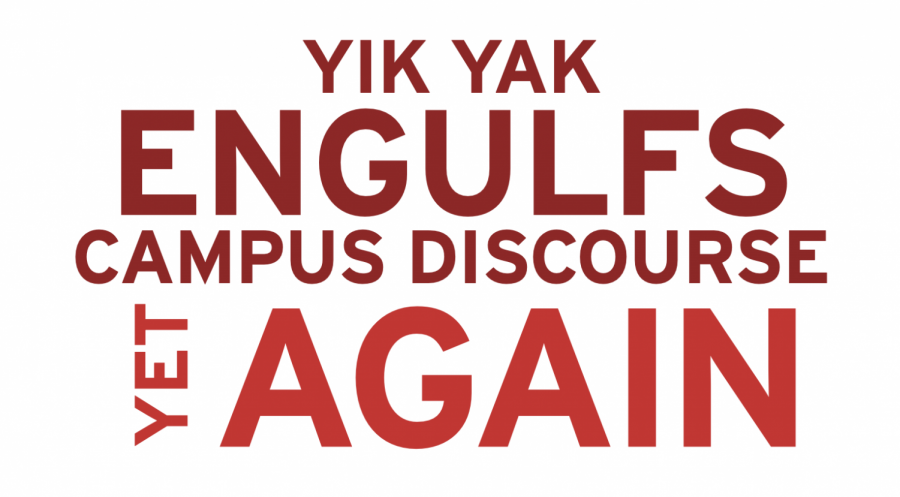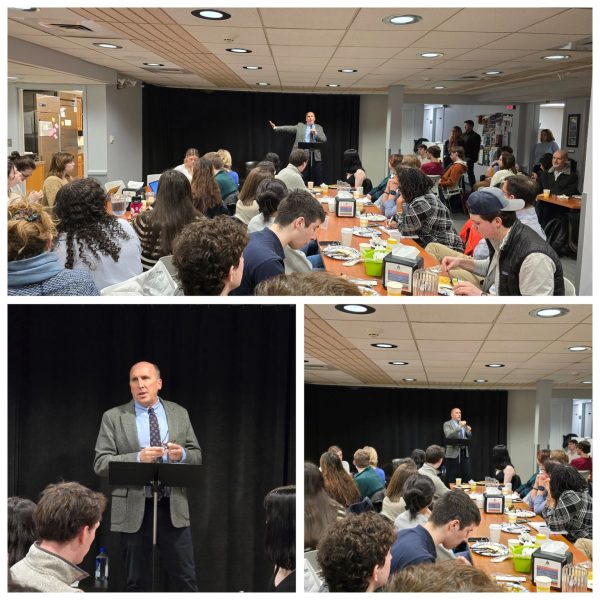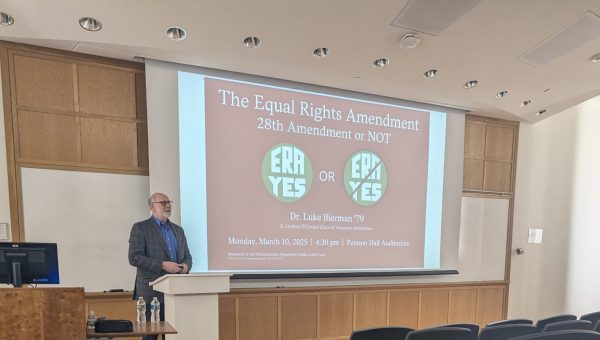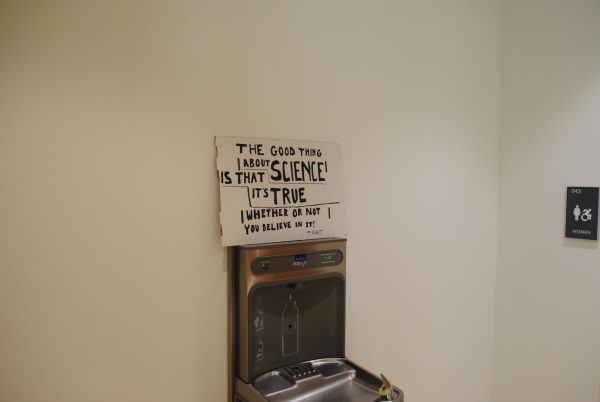Campus Responds to Yik Yak Controversy
WHAT IS YOUR EXPERIENCE WITH YIK YAK? SHARE YOUR PERSPECTIVE WITH US. FILL OUT THIS FORM TO MAKE YOUR VOICE HEARD IN OUR COVERAGE.
After Yik Yak, an anonymous social media platform surged across the student body this semester following the app’s controversial comeback, Vice President for Communications and Acting Chief Diversity Officer Laura Jack responded to what she called “problematic and racially charged” posts on the platform in a Sept. 22 campus-wide email.
“Colgate has experience with this platform and the kind of cowardly and racist postings its anonymity can breed […] If members of the Colgate community are specifically found to be posting messages that are in violation of the University’s Code of Conduct standards, they will be held accountable,” Jack said.
Through Yik Yak, users within a five-mile radius can anonymously write posts and upvote, downvote, or comment on other posts. Jack’s email encourages users to downvote and report all inappropriate posts to both the app, as well as Colgate’s Title IX Office.
Students have expressed opinions about the social media app, claiming its anonymity creates a harmful environment online.
“I personally have never been in support of any anonymous versions of social media,” junior Claire Rose said. “I think that the platforms we have currently create enough of a harmful environment while our names are attached to what we say. I can’t really imagine how anything good could come out of YikYak.”
Since its creation in 2013, YikYak has boasted a problematic history, harboring racist, targeted and discriminatory posts on the platform that reached a peak amid the Association of Critical Collegians “Colgate For All” sit-ins against racial injustice in 2014 and 2015, according to a 2015 episode of Gimlet’s Reply All Podcast. The episode recounts the experience of one of the organization’s leaders — Melissa Melendez ’14 — a target of much hatred on the app and the administration’s response.
“I was exhausted, angry, and sad. And on top of that, I didn’t know who to trust. I was in the middle of nowhere and the [Colgate] bubble was toxic,” Melendez said in the episode, ringing a familiar tone to much student discontent with campus discourse on the app today.
Jack’s email recalls this history, asserting though that the community came together positively in response. Gimlet’s podcast interviewed faculty who participated in what became known as the “Takeback,” where the community started using the app to spread positive messages, with professors often resisting the app’s anonymity by signing their names on their posts.
“The last time there were racist, sexist, and simply unacceptable posts that are the antithesis of our shared values, the Colgate community rallied together to reaffirm our values. (Some individuals even tried to flood Yik Yak with positive messaging reflective of our support for all members of our community),” Jack’s email said.
The Code of Conduct standards as found in the Colgate Student Handbook states: “Members of the community are expected to be good digital citizens and to refrain from online misconduct, such as feeding anonymous gossip sites, sharing inappropriate content via social media, unwelcome messaging, or otherwise using the ease of transmission and/or anonymity of the Internet or other technology to harm another member of, or group within, the university community.
THIS STORY IS PART OF A LARGER INVESTIGATIVE PROJECT. THE COLGATE MAROON-NEWS WILL SHARE UPDATES AS THEY BECOME AVAILABLE.










Megan Leo • Oct 11, 2021 at 11:37 pm
I’m from the Class of 2018. 2018 alumna. I remember when Yik Yak took over campus in 2014 & led to a sit in over racist comments that was covered by our MN staff as well as the NYTimes & HuffPost. Institutional turnover means we have short memories. And we all know what happens to those who forget history.
There are so many things that make me think Colgate has a bad case of memory loss. We don’t remember the student leaders who have sought to change our campus for better, and we don’t honor the pledges we’ve made over the years. I wrote about this when I was EIC of the Maroon-News – pointing directly to the Yik Yak controversy of 2014.
“ When I was a first-year student, the Association of Critical Collegians (ACC) led a sit-in lasting over 100 hours outside of the Hurwitz Admission Center, protesting university policies and attitudes and urging a more inclusive campus. Following the protest, the university published a website titled “Colgate for All,” meant to keep students up-to-date on the measures taken to respond to student demands. The website hasn’t been updated since March 2015, and former President Jeffrey Herbst and other members of the administration who negotiated a deal with the ACC have since left Colgate. The students who led the protest have graduated. The Class of 2018 is the last class who remembers this protest, and we’ll all be gone in a matter of months. On the two year anniversary of the protest, students reflected on the lack of change that has occurred since Colgate for All was announced. Who makes sure change lasts once student leaders graduate?”
Colgate has such a long history, and the Maroon-News has spent 153 years reporting on this complex, at times controversial, history. It is my hope that this record helps the future leaders who walk up this godforsaken hill to effectuate lasting change.
Karenna Warden • Oct 11, 2021 at 12:13 am
An excellent article from Bri. I am impressed by how completely yet concisely she manages to convey the controversy that is Yik Yak on Colgate’s campus. Her quotes and sources, from Laura Jack in September 2021 to Melissa Melendez in 2015, are carefully chosen and clearly required meticulous digging to uncover. The Maroon is lucky to have this talented writer; she never fails to deliver on exposing the university’s most important stories with the student, faculty and greater Hamilton body.